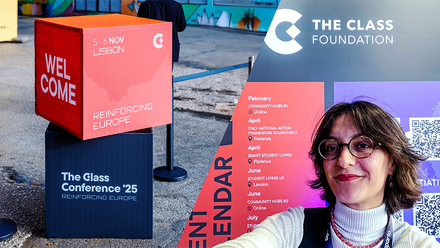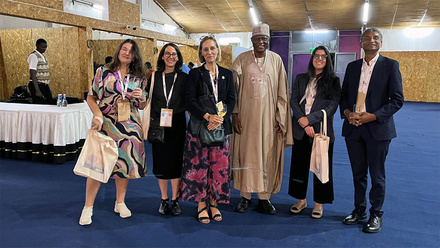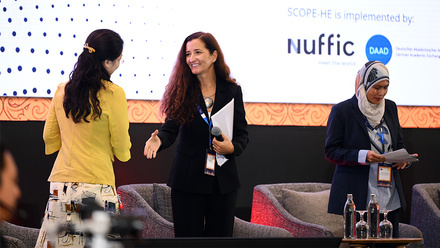Looking back on a year of inclusion, innovation and impact

Whether we’re ready for it or not, 2020 is on our doorstep. We’re two decades into the 21st century, but: where exactly does international education find itself at the moment, and what can we anticipate from the new year ahead?
Encompassing all voices: access, equity and inclusion
In 2019, discussions in (international) higher education circles in Europe focused notably on several key themes that require ongoing attention. Specifically, we have all become more acutely concerned with enhancing our capacity to innovate. We’re keen to guarantee greater inclusion of all kinds of stakeholders and constituents and develop more meaningful and sustainable modes of collaboration. And, ultimately, the call to ensure that our work yields positive impacts on a variety of levels is ever more urgent.
We have to muster the courage and humility to face honestly the systems of exclusion as they currently exist
Our own 2019 Annual Conference in Helsinki gave us a window on an immense array of inspired ideas and examples of good practice around the notion of ‘encompassing all voices’ in international education in Europe today. Of course, significant work lies ahead in order to achieve our aspirations for broader and more equitable involvement of actors in all that the field of international education has to offer. Our Helsinki conference closing plenary speaker, Expanding the story to encompass all voices, brilliantly summarised these challenges. On the one hand, we have to muster the courage and humility to face honestly the systems of exclusion as they currently exist. At the same time, we’ll need to deploy energy and empathy to advance new ways of overcoming the obstacles to inclusion that leave far too many individuals – and even institutions and countries – on the sidelines of meaningful internationalisation.
In this spirit, it’s important to note the strong signals emanating from the European Commission in relation to matters of inclusion. For example, it will be interesting to see how the vision for the next generation Erasmus programmes for the period 2021–2027 – which is to triple the number of learning and mobility opportunities from 4 million people in the current programme to up to 12 million people in the next iteration – will come to pass. The proposed focus on “better outreach and inclusion of people with fewer opportunities” is both very encouraging and challenging. The EAIE is highly supportive of any agenda that offers wider opportunities for underrepresented populations in international higher education in Europe, and even more broadly. Indeed, our planned participation in the 3rd Global Dialogue on international education, to be held in Argentina in April 2020, is a reminder of our ongoing commitment to this globally-relevant agenda.
Forging creative pathways: innovation and collaboration
Inclusion is surely important, but so too are innovation and collaboration, which offer exciting opportunities to improve the ways that European higher education plays its roles in individual societies and in the broader global context. Along these lines, it’s no coincidence that the EAIE’s 2020 conference theme is ‘forging creative pathways’.
International educators will have a key role to play in the success of the complex international partnerships at the heart of the European Universities initiative
An important example of developments in this area can be seen in the EU’s new European Universities initiative, which unambiguously aims to “bring together a new generation of creative Europeans able to cooperate across languages, borders and disciplines to address societal challenges and skills shortages faced in Europe”. This year saw the first round of alliances selected for funding – involving 114 institutions from 24 Member States, and altogether forming 17 new European Universities. The year 2020 will see decisions on a second round call, with a fuller commitment to and scaling up of these efforts expected under the Erasmus programme in 2021–2027. This work underpins the overarching goal of achieving a European Education Area that hopes “to harness the full potential of education and culture as drivers for job creation, economic growth and improved social cohesion, as well as a means to experience European identity in all its diversity”. As important groundwork is laid for this objective in 2020, international educators will have a key role to play in the success of the complex international partnerships that sit at the heart of the European Universities initiative.
Understanding how it all adds up: impact
In addition to a focus on inclusion, innovation and collaboration, we see a concerted movement to understand and enhance the ways that internationalisation in higher education can deliver benefits for society. In an era of enormous and acute challenges that are playing out on both very local and broadly global levels, how our work in international education contributes to the common good is massively important. Our Helsinki conference opening plenary speaker, Simon Anholt, gave us an impressive example of how education’s stakeholders the world over – students, educators, institutional leaders, politicians, and policymakers – can pool their collective wisdom in service to a powerful #GoodGeneration movement.
Looking toward 2020, we anticipate hearing more about how internationalisation in higher education for society is playing out, in Europe and beyond. The EAIE will continue to support thoughtful consideration and analysis of Measuring our impact: mission impossible? and evolve in our efforts related to the Sustainable Development Goals and other areas of socially responsible action.
Our collective efforts in 2019 have made a difference, and they will continue to do so in 2020
These are, of course, challenging tasks to undertake in the world today. Trade wars, nationalism, xenophobia, Brexit and the like foster mistrust, uncertainty and outright fear. The younger generation is focusing on climate emergencies and how we have to rethink fast the way we treat and live in our environment. New forms of collaboration are being developed. But, there is also room for immense optimism. The EAIE’s values run deep and provide a strong guiding light for our efforts. 2020 also brings an election year to the Association, which offers additionally exciting possibilities for new energy and outlooks.
Our collective efforts in 2019 to improve professional practice in the field of international education, generate deeper knowledge and understanding about internationalisation, and exert positive influences in the world have made a difference. They will continue to do so in 2020.






